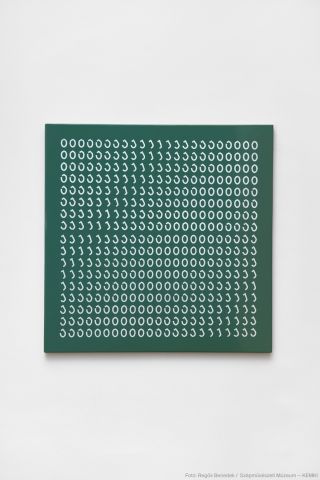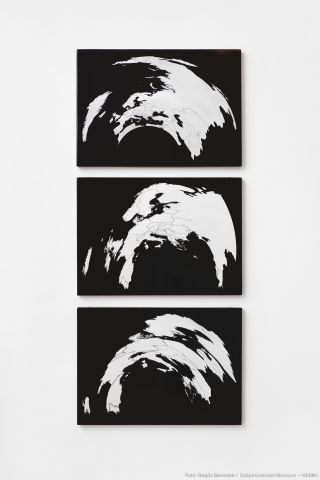‘call’
- « previous
- 1
- 2
- 3
- 4
- next »
GRÓF Ferenc: Somewhere between 0 and 1 (Hungarian National Painting Grey), 2016–2023
… the zeros. [3] In the context of the work from the Contemporary Collection, however, it is worth recalling the tabulated structures of “era-specific” colour samplings, and of subsequent attempts to track and trace these in the form of textile and enamel patterns (as in the case of Ádám Albert’s “portfolio”). [1] Mutató nélkül | B. A. úr X-ben [Without Index |Mr A. B. in X]. Exhibition by Ferenc Gróf, Budapest History Museum, Kiscell Museum – Municipal Gallery, 29 October 2016–15 January …
GRÓF Ferenc: Finding Central Europe, 2023
3 enamel panels, each 70 x 50 cm The work cartographically records the “phases” of a thought experiment connected to the problem of institutional identity: three enamel plates placed below one another document experiments (with a gradually narrowing focus) in the search for—and the finding of (?)—Central Europe. The cartographic settings for localising the “centre” consist of three versions of the world, transformed along three different …
László Beke Archives
… art projects, manuscripts, photographs, slides and printed publications. Of these, the so-called Imagination/Idea project conceived by Beke deserves special mention, along with many aspects of Hungarian conceptual art, mail art, fluxus, land art, happenings, environments, and action art. The László Beke Archive make a valuable contribution towards understanding and processing such initiatives of the Hungarian neo-avantgarde as the Chapel Studio of Balatonboglár, the start of the …
Zsuzsa G. Fábri's Artist Portrait Collection
… intelligentsia. The results of her photographic work—which began in 1978 and continued systematically for several years—were made public in 1984. That year, a selection of her photographs—which can be classified as environmental portraits—of prominent representatives of Hungarian visual art, literature, and science was published by Szépirodalmi Könyvkiadó under the title 40 Faces – 40 Essays. The artist portrait archive, which comprised part of Zsuzsa G. Fábri’s estate, was donated to …
Contemporary Art in KEMKI
… the documents of Mihály Munkácsy and László Moholy-Nagy, as well as details, visual elements and calligrams contained in the correspondence between Dezső Tandori and Dezső Korniss. The thematic unit of the enamel works shown on the first floor (Ádám Albert, Ferenc Gróf) operates with pictograms, concepts, cartographic elements and typographic solutions that are “interpreted” from a historical, institutional context. The latter works were produced at the turn of the ’70s in the enamelware …
- « previous
- 1
- 2
- 3
- 4
- next »



